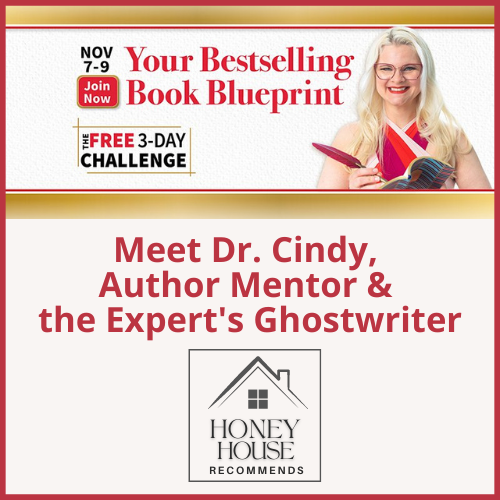I have witnessed Dr. Cindy’s career and her tireless support of writers for more than fifteen years. But you don’t have to take my word for how amazing she is. The testimonials of best-selling authors who have worked with Dr. Cindy are rich with superlatives from real people who took an idea to her, and saw their book go on to become a best seller.
Cindy Childress, The Expert’s Ghostwriter®, supports entrepreneurs to write books that make money and make an impact. Her clients achieve bestseller status, give TEDx Talks, win book awards, sign book deals, and more. She was awarded a gold American Business Award for Company of the Year: Media & Entertainment in 2022 and has been quoted in U.S. News and World Report, plus featured in Thrive Global, amongst many other publications. In addition to bespoke ghostwriting services, she leads online writing and editing classes and author mentorship programs.
Dr. Cindy holds a Ph. D. in English from the University of Louisiana at Lafayette. She’s also a foster mom with Rescued Pets Movement and a faculty member with Writespace Houston in Texas.
And she is today’s guest blogger.
Messy First Drafts and Melted Raspberries
By Cindy Childress, The Expert’s Ghostwriter®

“There’s raspberries in here,” Jack said.
My husband had just opened the microwave to warm up a breakfast sandwich.
I looked up from my oatmeal. “What? I’m eating raspberries.”
“No, they’re in here.” He motioned toward the microwave.
“How?” I asked. “I put them back in the fridge.” To prove it, I got off my stool at the breakfast bar and opened the refrigerator.
There was the fruit drawer. Blueberries, pears, grapes, even an almost overripe plum. No raspberries.
I turned to the microwave. The plastic container had melted, and cooked raspberries oozed from the microwave onto the white marble countertop.
When I made my oatmeal five minutes before, my cat, Orlando, was batting at the raspberries. It’s totally his style to hook a berry in his claw and play with it, getting red juice everywhere. I took the container away from him, and I guess I put it in the microwave. The cat didn’t make a mess, but even worse, I had… AND I had to admit it to my husband.
Sure, you might not think you’d microwave $5.95 of raspberries into plastic berry mush. But I bet you agree that: We’re all guilty of making little mistakes when we’re on autopilot and not checking our work.
That’s why we all need to hire an editor.
As a developmental editor for nonfiction books, I polish the throughline of your book to appeal to one target reader with exactly what they’re looking for and keep them captivated to the last page. I also look for ways to edit the book to better fit your goals, so we leave the reader eager to continue following you and learning from you—hopefully through your paid offers or at least your next book.
I start by getting a birdseye view of your manuscript. There may be gaps of information or places for you to add more stories or examples. Or there may be pieces of information so similar the reader doesn’t need all of it. Often, I move chapters and topics around to flow more logically and prominently showcase your best writing–in the most engaging way for the reader. Then I revise your Table of Contents to reflect the new writing we add and anything we move or omit.
With your revised Table of Contents established, I look for opportunities to use the creative writing adage, “show, don’t tell.” Use conversational language to draw the reader in and describe more, prescribe less. Then I find repetitious or off-topic dead ends to omit, alongside adding compelling details and a crystal clear message so the reader always knows why they’re reading what they’re reading. I don’t always change passive voice, but I look for it and pressure test whether a sentence will make more sense or impact if it’s written more actively. Often, passive voice is a way of avoiding assigning blame or investigating emotional wounds.
The last step is to address the voice and style of your writing so it consistently sounds like you and consistently addresses the target reader. It’s no good to write like a valley girl one minute and a librarian the next. Anyone who picks this book up should know the author could only be you.
The good news is—you can avoid a lot of writing mistakes (or not melt the proverbial raspberries) by planning a better book. I teach this strategy in Your Bestselling Book Blueprint: The FREE 3-Day Challenge. The challenge runs annually, and in the meantime, take my Discover Your #1 Bestselling Author Personality Quiz to unlock your writing superpowers and get regular writing inspiration and tips delivered to your inbox.

Comments are closed